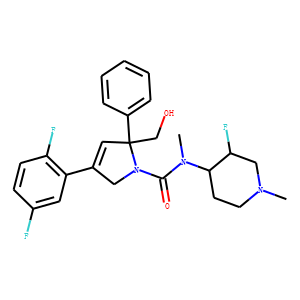| Reference | 1. Invest New Drugs. 2012 Jun;30(3):1088-95. doi: 10.1007/s10637-011-9653-1. Epub 2011 Mar 22.<br />
A phase I trial of MK-0731, a kinesin spindle protein (KSP) inhibitor, in patients with solid tumors.<br />
Holen K(1), DiPaola R, Liu G, Tan AR, Wilding G, Hsu K, Agrawal N, Chen C, Xue L, Rosenberg E, Stein M.<br />
Author information:<br />
(1)University of Wisconsin Carbone Cancer Center, 600 Highland Ave., Madison, WI 53792-5666, USA. [email protected]<br />
PURPOSE: The kinesin spindle protein (KSP) is essential for separation of spindle poles during mitosis. Its inhibition results in mitotic arrest. This phase I trial examined safety, tolerability, dose-limiting toxicity (DLT), maximum tolerated dose (MTD), pharmacokinetic parameters, and anti-tumor activity of MK-0731, a potent inhibitor of KSP.<br />
EXPERIMENTAL DESIGN: In part 1, patients with advanced solid tumors received MK-0731 intravenously over 24 h every 21 days starting at 6 mg/m(2), escalating until MTD was reached. In part 2, patients with taxane-resistant tumors received the MTD. Plasma samples were collected to analyze the pharmacokinetics of MK-0731. Tumor response was evaluated using Response Evaluation Criteria in Solid Tumors (RECIST) v1.0.<br />
RESULTS: In part 1, 21 patients (median age 63 years) were treated with MK-0731 at doses ranging from 6 to 48 mg/m(2)/24 h for median four cycles. The dose-limiting toxicity was neutropenia and the MTD was 17 mg/m(2)/24 h. At the MTD, AUC (±SD) was 10.5 (±7.3) μM × hour, clearance (±SD) was 153 mL/min (±84), and t(1/2) was 5.9 h. In part 2, 22 patients received the MTD and there were no DLTs. Although there were no objective tumor responses, four patients (with cervical, non-small cell lung, and ovarian cancers) had prolonged stable disease. CONCLUSIONS: MK-0731 at the MTD of 17 mg/m(2)/day every 21 days in patients with solid tumors had few grade 3 and 4 toxicities with the major DLTs at higher doses being myelosuppression. Anti-tumor efficacy was suggested by the length of stable disease in selected patients with taxane-resistant tumors.<br />
<br />
2. Anticancer Agents Med Chem. 2010 Nov 1;10(9):697-712.<br />
Discovery of allosteric inhibitors of kinesin spindle protein (KSP) for the treatment of taxane-refractory cancer: MK-0731 and analogs.<br />
Cox CD(1), Garbaccio RM.<br />
Author information:<br />
(1)Department of Medicinal Chemistry, Merck Research Laboratories, West Point, PA 19486, USA. [email protected]<br />
Current cancer chemotherapy relies heavily on cytotoxic agents, such as the taxanes and Vinca alkaloids, that interfere with the cellular machinery required for cell division and divert the cell down a pathway of programmed cell death. These antimitotic agents, or spindle poisons, target the mitotic spindle by binding to tubulin, a protein required not only for mitosis but also for structural integrity and proper function of healthy, terminally differentiated cells. To avoid side effects attributed to this nonselective mechanism of action, new targets in the mitotic pathway that act only in dividing cells were sought and a leading candidate to emerge from these efforts was kinesin spindle protein (KSP or HsEg5). KSP is a molecular motor protein that is expressed only during mitosis and controls the formation of a functional mitotic spindle. Inhibition of KSP causes mitotic arrest followed by cell death in malignant cells and thus has the potential to become a novel chemotherapeutic strategy with the potential for reduced toxicity. This article summarizes efforts carried out at Merck to discover potent, selective and water soluble KSP inhibitors that culminated in the discovery of MK-0731, the second KSP inhibitor to enter clinical trials. Of special focus in this article is how an HTS lead was optimized in apparently divergent directions, but these disparate leads converged in the design of compounds that overcame P-glycoprotein efflux and hERG channel activity, two issues that required considerable optimization within our program.<br />
<br />
3. J Med Chem. 2008 Jul 24;51(14):4239-52. doi: 10.1021/jm800386y. Epub 2008 Jun 25.<br />
Kinesin spindle protein (KSP) inhibitors. 9. Discovery of (2S)-4-(2,5-difluorophenyl)-n-[(3R,4S)-3-fluoro-1-methylpiperidin-4-yl]-2-(hydrox ymethyl)-N-methyl-2-phenyl-2,5-dihydro-1H-pyrrole-1-carboxamide (MK-0731) for the treatment of taxane-refractory cancer.<br />
Cox CD(1), Coleman PJ, Breslin MJ, Whitman DB, Garbaccio RM, Fraley ME, Buser CA, Walsh ES, Hamilton K, Schaber MD, Lobell RB, Tao W, Davide JP, Diehl RE, Abrams MT, South VJ, Huber HE, Torrent M, Prueksaritanont T, Li C, Slaughter DE, Mahan E, Fernandez-Metzler C, Yan Y, Kuo LC, Kohl NE, Hartman GD.<br />
Author information:<br />
(1)Department of Medicinal Chemistry, Merck Research Laboratories, P.O. Box 4, Sumneytown Pike, West Point, Pennsylvania 19486, USA. [email protected]<br />
Inhibition of kinesin spindle protein (KSP) is a novel mechanism for treatment of cancer with the potential to overcome limitations associated with currently employed cytotoxic agents. Herein, we describe a C2-hydroxymethyl dihydropyrrole KSP inhibitor ( 11) that circumvents hERG channel binding and poor in vivo potency, issues that limited earlier compounds from our program. However, introduction of the C2-hydroxymethyl group caused 11 to be a substrate for cellular efflux by P-glycoprotein (Pgp). Utilizing knowledge garnered from previous KSP inhibitors, we found that beta-fluorination modulated the p K a of the piperidine nitrogen and reduced Pgp efflux, but the resulting compound ( 14) generated a toxic metabolite in vivo. Incorporation of fluorine in a strategic, metabolically benign position by synthesis of an N-methyl-3-fluoro-4-(aminomethyl)piperidine urea led to compound 30 that has an optimal in vitro and metabolic profile. Compound 30 (MK-0731) was recently studied in a phase I clinical trial in patients with taxane-refractory solid tumors.<br />
|

